Baking is a recent love of mine. My husband can attest to the fact that my culinary skills hover right around the level of "microwave gourmand", so it was a shock to both of us when my first assays into the world of baking bread were successful. In this house, we define success as "we ate the whole thing in an hour." An entire loaf of bread. Poof! Gone. Mmmm.
Here's the secret, though: if you can assemble ikea furniture, you can bake bread. I may suck at cooking but I WIN at following directions, and that's all baking really is. None of this "add a dash of salt" or "season to taste" crap, oh no - you add one teaspoon of this, 6 ounces of that, specifically and methodically. It appeals to the part of my brain that likes putting things in order.
I owe my success to this:
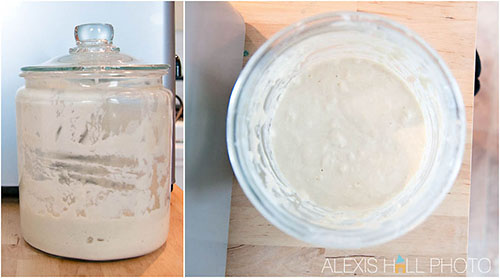
Alexis, why do you have a jar of muck in your kitchen?
It's not muck.
It's sourdough starter.
What is sourdough starter?
Sourdough starter is a mixture of flour, water, yeast, and bacteria (the good kind, like the Activia yogurt ads are always singing about) that is used to help your bread rise and add flavor, which can range from very mild to mouth-puckering sour.It's like a pet - it has to be cared for. It must be fed weekly (it eats flour and water), live in a clean habitat (I clean out the jar once a month), and produces "waste" (called hooch - liquid that smells an awful lot like beer that can be poured off or stirred back in, but is completely harmless).
And if you're going away for an extended period of time, it can easily be frozen and then thawed with no ill effects when you come back.
Much more low maintenance than the cats.
I've been baking with my starter since early November, so I am by no means an expert. Everything I know about it can be attributed to a few key websites (see links at the bottom of the post) and the handout that King Arthur Flour so helpfully sent along with the starter itself.

Is it done yet? Is it done yet? How about now? Now? What about now?
Where do you get starter?
Yes, you can purchase starter - I highly recommend it. There are lots of sites with instructions on how to make your own, but it can be difficult and the results aren't always great. If you're at all interested in baking with a starter, I'd buy one. I got my starter from King Arthur Flour. At $6.95 and free shipping, it's hard to beat the convenience and reliability of their starter.Where do I keep it?
You'll need a place for your starter to live. King Arthur sells a fancy-pants sourdough and crock set, but to be honest, I wouldn't waste your money. I got my glass jar from target for $6. It's really, really, super duper important that wherever your starter lives is CLEAN! You don't want Chinese leftovers mixing with your starter; that's just gross and will most likely ruin the starter's magical abilities.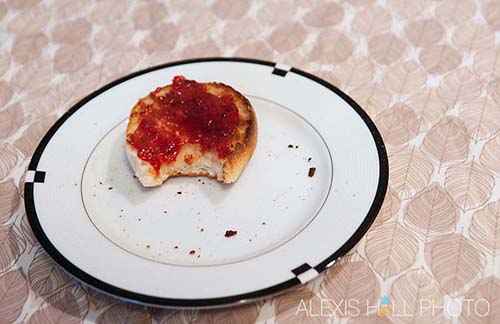
How do I take care of it?
Food: your starter eats only two things, flour and water. I use King Arthur all-purpose flour (yes, I do love all things KA, and again, don't buy it from them - it's much cheaper at the grocery store or a place like Costco) and water filtered through our Brita.The feeding schedule took me a little while to get the hang of, since I read so many different ways of doing it. You can neglect your starter for weeks at a time, you can feed it every day, or the reality could fall somewhere in between.
My tip-of-the-iceberg understanding is this: if you're going to be baking often (probably three or four times a week), it's better to keep your starter on the counter and feed it every day. If you're like me and only bake once a week, keep it in the fridge and only feed it once a week.
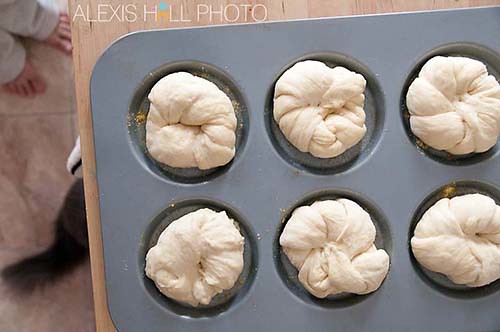
Cats and bare feet are essential to your success as a baker.
So how -exactly- do I feed it?
Again, this is only what I do - another method may work better for you. Sunday is my baking day, so I pull the starter out of the fridge on Saturday night. Then I do one of two things, depending on how lazy I'm feeling:- The ambitious way: I take out one cup of starter after stirring in any liquid on top and make pizza dough (we have homemade pizza once a week and it's DELICIOUS - see below for the recipe). Then I feed the starter equal amounts by weight of flour and water. That means 4oz flour and 4oz water, for instance - not one cup of water and one cup of flour, since that would give you way more water than you needed. I stir that up, then let it sit overnight. In the morning, it's ready to go!
- The lazy way (aka, the normal way): I don't make pizza dough at night. I take the starter out of the fridge, feed it, put it on the counter to sit overnight, and then do the pizza dough first thing in the morning.

Pan-friend English muffins. You will never go back to Thomas.
How much do I feed it?
The answer is, it totally depends. If I'm planning on baking a lot (which for me means 3-4 different recipes), I'll need a lot of starter, so I'll feed it a lot - maybe 8oz each of flour and water. If I'm not baking at all, I'll just feed it a couple tablespoons to keep it going and then stick it back in the fridge. The great thing about starter is that short of storing it in your oven or feeding it compost scraps, it's super hard to kill.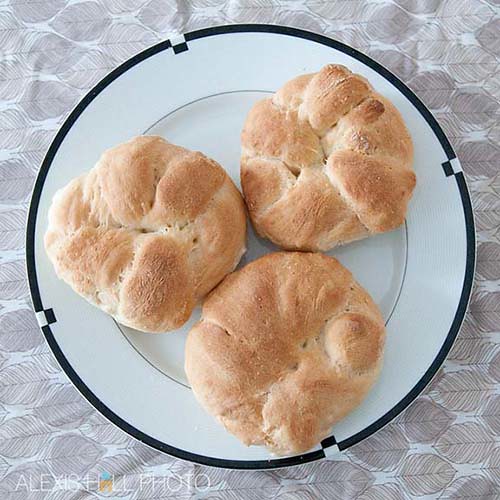
Let's get to the baking, already!
One thing that prevented me from jumping into baking with starter sooner was that I thought you could only make bread. And how much sourdough bread can two people eat, really?(A LOT. It's really good.)
I have four recipes that I use all the time, and I know I've just scratched the surface of what you can do with your starter.
Here's what I bake:
I'd also love to try bagels - I think that's next on the list for me.
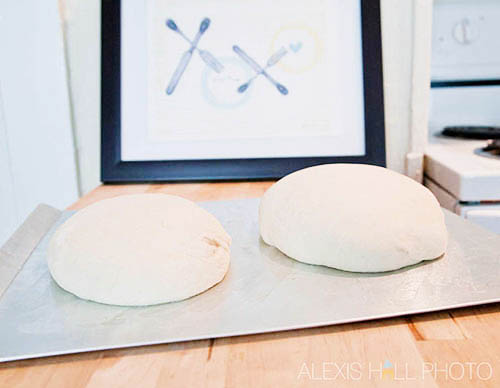 Hello. We will be delicious in 30 minutes.
Hello. We will be delicious in 30 minutes. Resources
King Arthur Flour: Surprise, surprise! They have a ton of great recipes that use sourdough starter, and they have a fantastic primer on sourdough that goes into more detail than I have.Passionate Homemaking: This blog is a great resource not only for sourdough recipes and tips, but other frugal, natural recipes and hints. Fair warning: the Passionate Homemaking blog is written from a very Christian perspective, so check out the other resources that I've listed here if you would prefer to steer clear of that.
The Fresh Loaf: This is an intense site about bread baking. A lot of it gets very scientific and goes over my head, but the forums have some really helpful information if you have specific questions about sourdough baking.
Chocolate and Zucchini: Do a search for "sourdough" and a lot of great stuff comes up, including the bagel and English muffin recipes I linked to above. She also has a really informative post that I've bookmarked for when I get more comfortable with bread-baking about converting yeast-based recipes to use with a starter. The math makes me go a little cross-eyed, so I'm leaving that alone for now.
No comments:
Post a Comment